
If you are under 18 years old, and you are traveling from Ukraine or another country to Romania on your own, or with someone that it is not your parent, get to know the processes at the border and how to prepare your trip. 🇷🇴. 🤝
I’m under 18, what do I need to know about my rights here?
You are safe and welcome in Romania and have the right to stay in Romania 🇷🇴🙌. The government authorities and local and international organizations are here to help you. You can find more information here about available services and support. As a child, you have rights such as the right to stay with your family, to go to school, play, get help if you have been hurt and to have your ideas and views taken seriously.
I’m under 18 and from Ukraine. Can I travel alone from Ukraine to Romania?
If you are under 18 years old, and you want to exit Ukraine on your own, or with someone that it is not your parent or close relative, there are different rules and procedures.
- If you are 16 or older – if you are between 16 and 18 years old, under Ukrainian law, you are allowed to cross the border without an accompanying adult.
- Below the age of 16 – if you are traveling without an authorized adult, you will not be allowed to cross the border, and you will be referred to the Department of Child Care Services within Ukraine.
If you have not reached the age of 16 you can cross the border if you are accompanied by an adult relative (i.e., grandparent, aunt/uncle, adult sibling, or step-parent). To be allowed to exit Ukraine you and the adult relative you are traveling with, will need to provide certain documents, this may include:
- an international passport, or in the absence of an international passport, a birth certificate or National Passport (National ID);
- documents confirming family ties (birth certificates, marriage certification, etc.) and/or,
- a written statement from one of the parents, that has been certified by the Guardianship Authority in Ukraine (in case kinship cannot be confirmed through presented documentation).
If you have not reached the age of 16 you can also cross the border into Romania accompanied by an adult who has been authorized by one of your parents to care for you. The adult must submit a written statement from one of your parents that has been certified by the Guardianship Authority in Ukraine.
There are times in which border guards have requested notarized consent of the child’s parents (if they reside in the western part of Ukraine) giving permission for the accompanying adult relative to care for and travel with you. You will also need to provide your available documentation such as: international passport, or the child’s birth certificate or National Passport (National ID).
I’m under 18 and from Ukraine. Can I travel alone from Ukraine to Romania through Moldova?
When exiting Ukraine, the same procedures outlined above apply, but in Moldova you will be required to follow the Moldovan procedures established for children arriving alone or with an adult other than their parent(s) or legal guardian. For more information, please see the UNHCR Moldova Help website.
I am under 18. What will happen if I arrive in Romania alone or if I don’t have an identity document or a power of attorney document?
If you are younger than 18 years old and you arrive in Romania without an adult, the Romanian Border Police will not deny you entry to the country and they will seek the intervention of the DGASPC. The DGASPC will work with you to identify the best option for you, based on your specific situation. They will make sure to consult you, and, if possible, your parent(s). You should know that you will not be able to travel freely within the country or to exit Romania without an adult.
If you don’t have all the necessary documents the Romanian Border Police will refer you to the Direcția pentru Asistența Socială și Protecția Copilului (DGASPC), the Romanian county child protection authorities. DGASPC will ask you for information to better understand your situation and to make sure you are safe.
If you are traveling with an adult friend or relative, DGASPC will speak with them and, if possible, your parents (by phone). This process can sometimes take time and DGASPC will make sure you have a safe place to stay. If DGASPC determines that it is safe for you to remain with the adult you are traveling with, they will authorize you and the adult to leave the border area, but if DGASPC determines that it is not safe for you to remain with the adult you are traveling with then they will take immediate action to ensure your safety. DGASPC will identify suitable accommodation where you can stay and receive support while they identify longer-term solution.
What if I want to travel alone to Romania where I will join an adult relative residing in Romania?
In this case, your adult relative should come to the border crossing point to meet you. If your relative does not have a power of attorney document for you, the DGASPC will conduct an assessment to make sure it is safe for you to live with them. If they determine that it is safe, your relative will need to acquire a notarized document from Ukraine, if you are from Ukraine, accepting temporary responsibility for taking care of you in Romania.
In case your relative is not at the border when you arrive, the DGASPC will make sure you have a safe place to wait until your relative arrives to pick you up.
Can I fly from one of Romania’s airports to another country if I am alone and under 18?
No. The same procedures that apply to land borders also apply to the airport. You will not be allowed to fly out of Romania if you are not accompanied by an adult who has legal responsibility for you.
You may need to wait in Romania while the DGASPC assesses your situation and figure out the best way to help you. If needed, the DGASPC will make sure you have a place to sleep (you will be allowed to remain with your caregiver if you are traveling with an adult, unless they suspect you are unsafe with this person).
I am Ukrainian; do I need a visa to be able to stay in the country or register with the authorities?
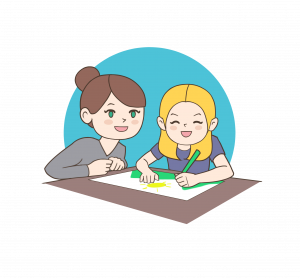
Children and their families fleeing from Ukraine have been welcomed by countries in the region and are able to stay in Romania for 90 days. 👍🏾. You don’t have to worry about being forced to return home after this period and if you wish to remain in Romania, you can apply for Temporary Protection or request asylum. If you stay in Romania, you will be safe and receive help with accommodation, food, transport, health and schooling for you and your family.
You are not required to present travel documents when crossing the border, but you might be asked to present personal identification, so remember to bring your most important documents with you if you can (internal passport, foreign passport, birth certificates). For visa-free travel within countries of the European Union that have agreed to allow this – the Schengen area- you will need a biometric passport – the passport that have a chip that can be scanned electronically. Biometric passports have an icon on the front that looks like an equal sign with a dot. In many countries, you will need to register with the authorities, UNHCR or local organisations to get assistance. For more information about procedures to register in Romania see the UNHCR site: https://help.unhcr.org/romania/
There are so many organizations and people offering to help. How do I know who to trust?
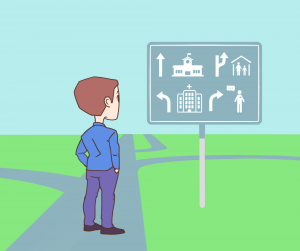
Many people want to help and are offering support, but it is important to know who to trust. People working with organisations should wear a vest, or jacket, or carry an ID card with a logo. If you are not sure, you can ask to see their ID. You have the right to refuse support if you are not sure who they are or don’t feel comfortable. It’s sometimes hard to know who to trust, so you can ask an adult you trust or who is working with organisations registered to help and has an ID. ✋ Do not hand your documents to anyone who is not working for an organization registered to help and has an ID ✋.
You can also go to the UNHCR’s Help site for the information you can trust.
What else should I know?
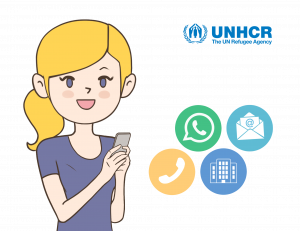
- If you have documents that show who you are – such as an ID card or passport –keep them safe! Nobody is allowed to take these documents from you or your family, except border guards or police who will only have to take them for a short amount of time and return them to you. You can usually tell who they are because they wear an official uniform. Do not give your identity documents to anyone, not even for accommodation or for transport .
- The DGASPC are sometime present at Romania’s border crossing points but you can also contact them at #119 if you need help when you cross the border. Their local contact details are also available at each of the border police posts.
- If strangers offer to take you away from your family to give you a place to stay, for work, or school tell an adult you trust and don’t accept these offers. Never agree to meet someone you don’t know alone. When you need to go out of the place you are staying in, always try to go with someone you feel safe with, or in a group, and after dark always ask a trusted adult to go with you outside your home. If you are in a situation that makes you worried, you can:
- Tell someone you trust and ask for help or call
- UNHCR 📞021 201 7873/+40723653651
- Romanian National Council for Refugees (CNNR) 📞 +40 730 073 170 / +40 721 206 926
- If you have concerns or information about possible misconduct by any UNHCR staff member or other person/entities with a contractual relationship with UNHCR, you can contact the Inspector General’s Office.
Who can I ask if I have more questions?
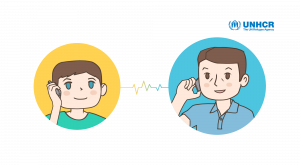
There are many organizations here to help – the authorities of Romania, local associations and people such as border guards, police officers, social workers, psychologists, medical staff, teachers, and organizations.
You can always contact UNHCR Romania (+40 723 653 651) if you need assistance, call the Refugee National Government hotline: 0213456789 or find more information on the Romanian Government’s website.
I feel sad, angry, worried, scared, or confused. Is this normal? ☹️ 😠 😕 😰 😧
It is normal to feel upset after having to leave your country and seeing or hearing about so many terrifying things. You may have difficulty putting things that you saw or experienced out of your mind. You may be separated from people you love and worried about them or worried about what will happen next. You may feel like nothing is familiar. Some simple things to try that may help you cope with this difficult situation:
- Try to keep a routine as much as possible in your new environment, such as going to sleep on time, getting up at a regular time, eating regular healthy meals, and helping around the place you are staying now
- Spend time with your family and friends doing things you enjoy together
- Helping out others in your community; helping others can also help you feel better in return
- If you feel angry or overwhelmed, take a break and focus on breathing slowly for a few minutes. It can also be helpful to look for some quiet or interesting things around you, such as the sky, a tree, and the sounds of birds.
- Do regular physical activities such as walking, or exercise if you can
- Keep in contact with family and friends even when you are apart. If you can’t contact them now, write a letter to give to them when you can.
- Take a break from the news sometimes and avoid disturbing photos or videos that might be circulating
- Talk to someone you trust to be a good listener about how you are feeling. Don’t hesitate to ask for help from a psychologist or counsellor or doctor.
- Participating in some organized groups to talk about your feelings with others can also help you out later on.
- If you feel up to it, be a good listener to someone else. Often it doesn’t matter if we don’t know what to say, just listening and showing we understand is enough.
I want to go back to school as soon as possible. What should I do? 🏫 🎒 📚
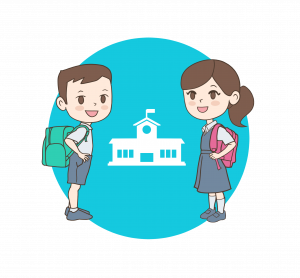
You have a right to go to school and you do not have to pay extra compared to children from Romania. If you are not going to school, the first thing you need to do is get registered for school. Public schools are free. The process for registering can change depending on the type of school, you need to go to the nearest school to where you are staying and ask there. You can also explore what options are available for free Romanian language courses for foreigners with organizations present in Romania.
If you are an asylum seeker (not a holder of Temporary Protection) and need help because you don’t speak Romanian, you can learn Romanian in one of the six Regional Procedures and Accommodation Centers for Asylum Seekers.
